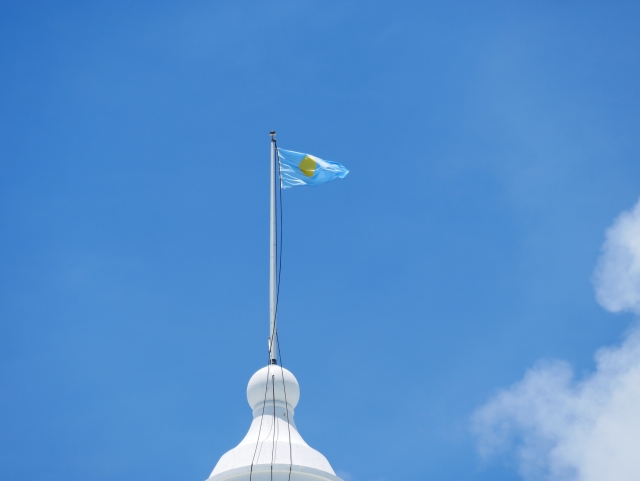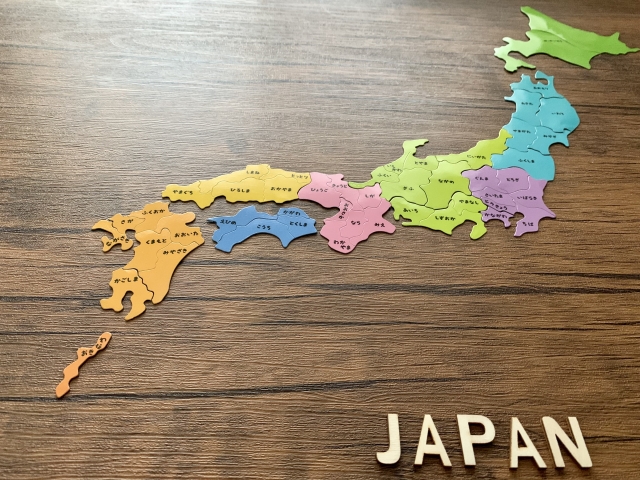If you are interested in Japan, the first thing you will probably wonder about is the language spoken in Japan. When you go to Japan, you would like to know about the official language and second language used in Japan. In this article, I will talk about the types of languages spoken in Japan. In addition, I will introduce whether foreign languages are used in Japan. And in the end, I will tell you how to learn Japanese. By reading this article, you will know exactly how to learn the official language of Japan and the Japanese language!

What is the official language in Japan?
Japanese is the language of Japan. SUSHI and RAMEN would be voted as the most famous Japanese words in the world. Japanese is, of course, the language spoken in Japan. However, it is not actually an official language of Japan. You might be surprised but Japan does not have an official language.
There is only one country in the world where Japanese is an official language. That is Palau. Did you know that Palau was a mandate territory of Japan at the time of World War II? In short, Palau was under the control of Japan. Japanese was used due to the influence of school education in Japanese, which led to the establishment of the Japanese language as the official language.

Today, Japanese is still designated as the official language of the Angaur Province of the Republic of Palau, but there are few people who speak Japanese in Palau. This is because Palau has more than one official language. In Palau, Palauan and English are the official languages, in addition to Japanese. So, Palauan is mainly spoken. By the way, some words based on Japanese are also found in this Palauan language. Please check out some interesting Palauan words originating from Japanese, such as “Atama-guruguru,” which means confusion.
In Palau, several languages are spoken, such as Palauan, English, and Japanese, but Japanese is the dominant language in Japan. Languages from various countries such as English, Portuguese, Chinese, and French have been incorporated into Japanese as foreign languages, but Japanese has been spoken consistently. Dialects do exist, but they are part of the Japanese language. There was no need to designate Japanese as the official language of Japan. For this reason, there is no official language in Japan legally until today. In the future, when the number of foreigners living in Japan increases and a variety of languages got spoken in Japan, Japan may have an official language.
What languages are actually spoken in Japan?
Now, let’s look more closely at the languages spoken in Japan. The most widely spoken language in Japan is Japanese. The Japanese language is divided into several dialects, and the language based on the Tokyo dialect is considered the “standard Japanese.” Japanese dialects are broadly divided into “Mainland” and “Ryukyu.” Furthermore, it is also divided into “Eastern Japan,” “Western Japan,” and “Kyushu.” There are more Japanese with has a different “accent,” which has “difference intonation, pronunciation, and accent” depending on the region. In addition to Japanese, there are the Ainu language of Hokkaido and the Ryukyu language of Okinawa Prefecture. Let me introduce each of them.

Kanto area in East Japan
The Kanto area is in eastern Japan. Starting with Tokyo, the capital of Japan, the six prefectures of Kanagawa, Chiba, Saitama, Gunma, Tochigi, and Ibaraki are often referred to as Kanto. In Kanto, “standard Japanese” is basically used. Standard Japanese is a grammar and speech style that is widely accepted within a group of people. In other words, the standard language is the language that can be understood anywhere in Japan.
In Japan, standard Japanese has been formed based on the Tokyo dialect. Although there are no clear rules, the Japanese textbooks used in school education have a strong influence on the written language. In the spoken language, NHK announcers’ accents and intonations serve as role models. Both are things that people born and raised in Japan have many opportunities to meet. So, they have grown up as language that is understood throughout Japan.
So far, we have told you that standard Japanese is generally spoken in the Kanto area. However, there are of some dialects in the Kanto area as well. There are basically unique dialects for each prefectural unit, such as the “Tochigi dialect” spoken in Tochigi and the “Ibaraki dialect” spoken in Ibaraki. I will introduce them next time. If you are interested, please look it up by “prefecture name + dialect”.
Large cities outside of Kanto area
Next, let’s look at the areas outside the Kanto area that are called “large cities”. The Statistics Bureau of the Ministry of Internal Affairs and Communications designates the following areas other than the Kanto area as large cities.
・Sapporo, Hokkaido
・Sendai City, Miyagi Prefecture
・Niigata City, Niigata Prefecture
・Shizuoka City, Shizuoka Prefecture
・Hamamatsu City, Shizuoka Prefecture
・Nagoya City, Aichi Prefecture
・Kyoto City, Kyoto Prefecture
・Osaka City, Osaka Prefecture
・Sakai City, Osaka Prefecture
・Kobe City, Hyogo Prefecture
・Okayama City, Okayama Prefecture
・Hiroshima City, Hiroshima Prefecture
・Kitakyushu City, Fukuoka Prefecture
・Fukuoka City, Fukuoka Prefecture
You can see that large cities can be found all over Japan. From Hokkaido in the north area to Fukuoka, Kyushu, in the south area. In these areas, standard Japanese is basically spoken. However, it is common to find dialects and accents in the language spoken by the people who live there.
Outside large cities
Outside of large cities, dialects and accents are more commonly used. Vocabulary, grammar, accent, and intonation are very different from standard Japanese. Even Japanese people from different backgrounds often do not understand each other’s dialects.
In addition, languages other than Japanese are spoken in Hokkaido and Okinawa. Hokkaido, the northern island of Japan, is home to people who speak the Ainu language. They are the indigenous Ainu people of Hokkaido. Today, the Ainu language is on the verge of extinction due to increased intermixing with Japanese and the increasing popularity of the Japanese language among the Ainu. The Japanese language is also known to retain words borrowed from the Ainu language, such as “reindeer” and “sea otter”. Okinawa Prefecture, the southernmost prefecture in Japan, has a Ryukyuan language. An independent small island, Okinawa Prefecture was originally a separate country called the Kingdom of Ryukyu. The Ryukyuan language was spoken in that country. Today, it is sometimes treated as part of the Japanese language, such as the Okinawan dialect, but linguistically, it is a completely different language from Japanese. This is also a language in danger of extinction, with the number of speakers decreasing every year. Thus, although non-Japanese languages such as Ainu and Ryukyuan existed, they are now almost entirely Japanese.
Can foreign languages be understood in Japan?
Japan has no official language, but the dominance of Japanese is overwhelming. The indigenous languages Ainu and Ryukyu are also in danger of extinction, and it is safe to say that no second language exists. English is taught in mandatory education, but it is not widely used. If you want to speak English, younger people may be more likely to do so. This is because English education has become more widespread among younger people in recent years, with English education becoming a requirement in elementary schools. If you want to use a language other than English, it is recommended to use a translation application.
If you want to learn Japanese
To summarize what I have explained, Japanese is the dominant language in Japan. Although the Japanese language is characterized by a rich variety of dialects, the standard Japanese is basically spoken in the Kanto area, especially in Tokyo. Furthermore, even in large cities outside the Kanto area, you will be able to speak in standard Japanese. Outside of large cities, standard Japanese is still spoken, but locals may have a strong dialect or accent. English is also listed as a second language in Japan, but it is not widely spoken throughout the country.
So, if you want to learn Japanese in Japan, the Kanto area is a good place to start. Outside of the Kanto area, choose one of the larger cities to make it easier to learn the standard language that is understood throughout Japan. As a first step, we also recommend online Japanese language classes and online events. In the case of online transactions, the standard language is often adopted regardless of the region. It may be a good idea to learn online first, and then learn Japanese in earnest in Japan.
Ohanasi Kagawa holds online language exchange events on weekends. Japanese language learners and English language learners are paired together. You then switch between English and Japanese every 15 minutes. This way, both of you can learn a language. Online, you can communicate with Japanese people without having to go to Japan. The rules are designed to ensure that you can participate safely. So, even if you are new to online events, please check them out. This is the perfect event for those who want to spend a little time in Japanese while maintaining their current lifestyle.
That said, you might still not be confident in your Japanese speaking ability. You’re not sure how to study Japanese. For people like that, we are currently offering free Japanese language consultation and free lessons for a limited number of 10 people each month.
You don’t know how to study Japanese. If you are interested in taking Japanese lessons to solve what you don’t understand, please feel free to join us.
If you are interested, please click the URL or image below.
Click here to see more details >>>







